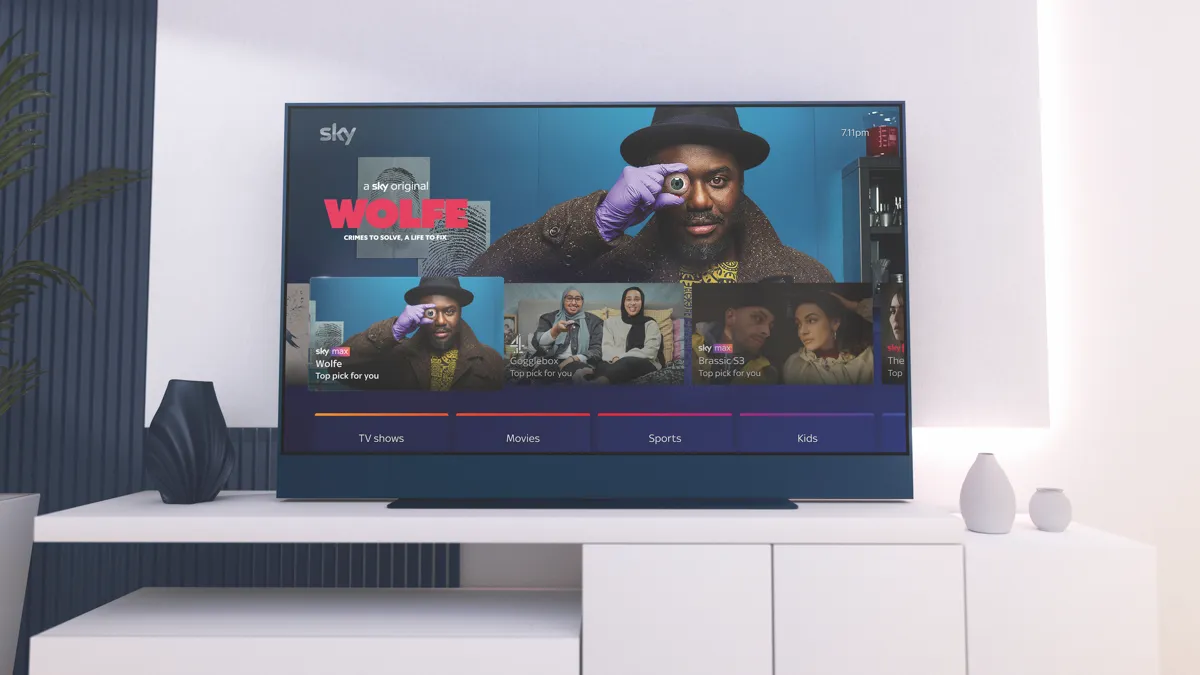This is Sky’s first TV, which comes with all of its TV services ready to go – no dish or top box required. Plus, there are some decent built-in speakers at the back. You can pay for it in the same way you might buy a smartphone with a phone contract.
We got a first look at the new smart TV, and here's what we found out:
Do people still use satellite dishes?
To the Netflix generation, a satellite must seem archaic and that’s exactly one of the problems Sky is trying to solve. Everything you used to get through the dish on Sky will now be available over your home Wi-Fi, which means you don’t need to get an engineer coming to your house to get started. Sky reckons you should be up and running in a matter of minutes with just one power cable and your Wi-Fi password.
Even better, it comes with installation included, so Sky will deliver the TV, set it up and even take away all of the packaging to be recycled – which is all part of its eco-friendly credentials. This is the first television to be certified carbon neutral.
Read more about media and the climate:
Will my Wi-Fi be able to manage it?
Sky has built Sky Glass to be very efficient over humble Wi-Fi speeds, so the experience shouldn’t be marred by buffering. It also uses the latest Wi-Fi 6 standard, so it won’t hog your bandwidth either.
One Sky Glass requires an 11Mbps connection, whereas multi-room will require 30Mbps. Sky reckons 98 per cent of home Wi-Fi connections are already able to manage this, so it shouldn’t be a problem for the majority of people.
What happens if my Wi-Fi goes down?
This is the Achilles’ heel in Sky Glass. It relies on Wi-Fi, and without it, you won’t be able to access any of the TV services or recordings. The TV itself will still work of course, so you can use your games console or Blu-ray player. There is a back-up aerial/DTT input in the back for watching standard TV until your Wi-Fi is back up and running.
If I don’t have a box, how will I record shows?
Your recordings will be stored in the cloud, ready to access whenever you want. Sky has created a new feature in its interface called Playlist, which is where you’ll find all your content – it will even pull in other episodes and series of your recorded shows for you to watch on demand. And because it’s in the cloud, there are no limits to the number of shows you can record at the same time, and there are no storage limits either.

Can I only watch Sky content on Sky Glass?
No, Sky wants to simplify the way we watch our favourite shows. It’s fair to say the act of watching TV has become fragmented in recent years, so we spend a lot of time dipping in and out of different apps looking for something to watch.
On Sky Glass, content from various partners – including Netflix, Amazon Prime Video, Disney+, BBC iPlayer and more – will all be visible and accessible on the home page, alongside Sky exclusives and other TV suggestions. You will need the various subscriptions up and running to access the content, but a Netflix account is included in the Sky Glass base package.
If you like the look of something, you’ll be able to click into it and watch it from there – no need to go in and out of separate apps anymore. That applies to the search and voice search functionality too, so it should create a much more fluid, homogenous experience.
But is the telly actually any good?
Sky Glass is a 4K TV that supports Dolby Vision (as well as HDR10 and HLG for TV broadcasts) and Dolby Atmos. It’s an LCD display that uses quantum dot technology, similar to Samsung’s flagship TVs. The picture quality isn’t going to worry top-range OLEDs out there, but from our brief demo, it certainly looks crisp and vibrant.
It looks pretty chunky…
Compared to the super-slim sets we’re used to seeing these days, the design of Sky Glass will look a little unusual. However, as well as simplifying the viewing experience, Sky is also doing its best to simplify things from a hardware perspective too.
That means Sky Glass has six built-in speakers that are capable of delivering Dolby Atmos sound, angled around the screen to give added depth and height to the soundtrack. This means you don’t need to worry about the faff and cost of an extra soundbar.
There’s also a built-in stand for wall mounting, should you wish, and it’s available in a choice of five unique colours, each with a brushed finish and colour-matched remote.
More tech reviews:
- Apple AirPods Max review: Why these headphones are worth £549
- 9 of the best cheap gadgets for a budget-friendly life upgrade
Sounds good, how much will it cost?
Sky Glass will be available in a choice of three screen sizes, 43-inch (S), 55-inch (M) and 65-inch (L), and cost £649, £849 and £1,049 respectively. They will all have the same specifications, so you’ll get the same viewing experience no matter the screen size you choose.
However, instead of paying for it upfront, Sky will offer customers the option of paying for their TV as part of their monthly Sky subscription, a bit like you would a mobile phone contract.
You can choose to pay for your TV over a 24- or 48-month contract, meaning it starts at £13 per month for the 43-inch Sky Glass. You’ll then need to add the price of your chosen Sky packages on top of that – the base package costs £26 per month, which includes your subscription to Netflix.
- This article first appeared inissue 369ofBBC Science Focus Magazine–find out how to subscribe here